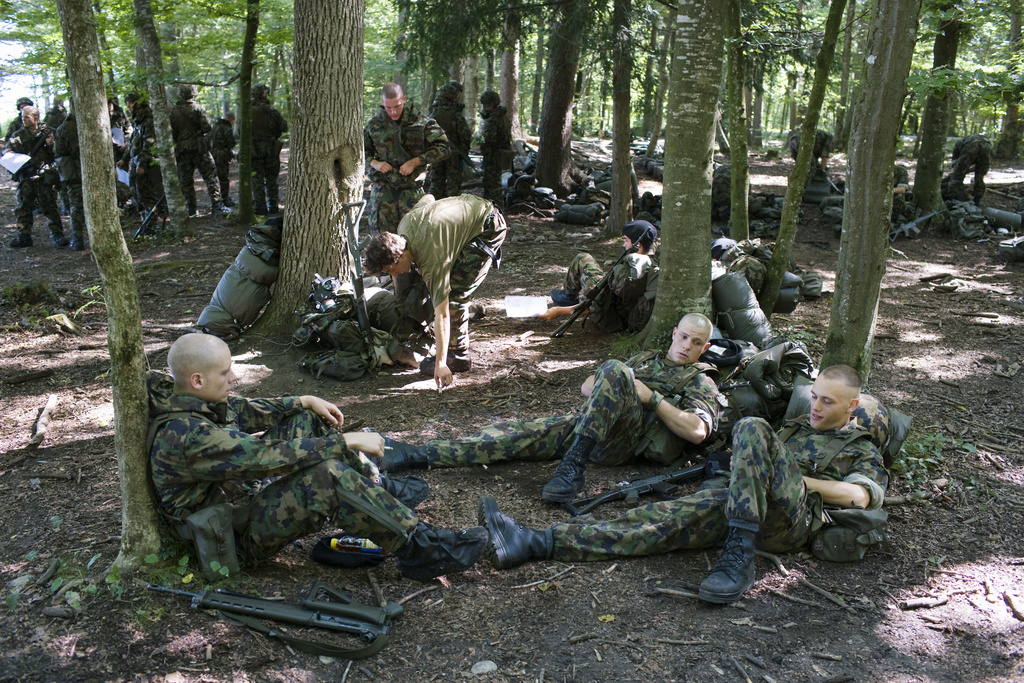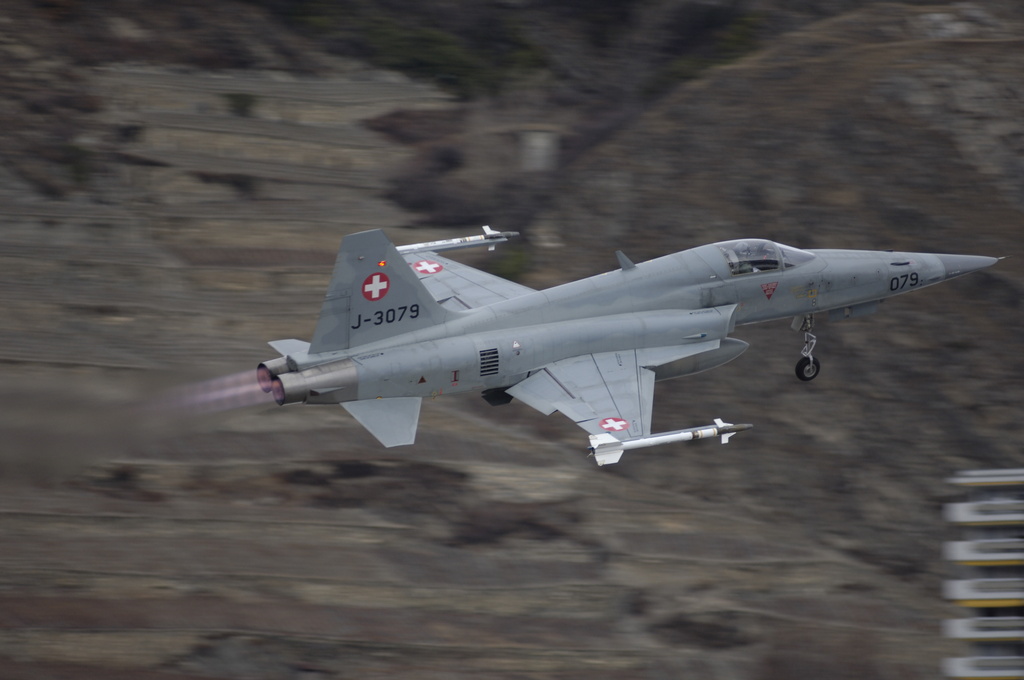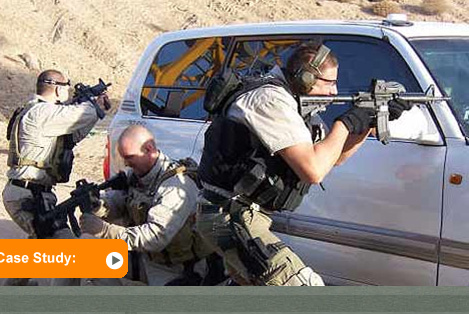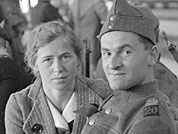The collapse of the Swedish army

Does Switzerland still need an army to defend itself given that Europe is now a continent at peace, wonders Bertil Galland.
The Swiss appear to be unaware of the drastic steps taken by Sweden, which shares our neutral status.
Not a day passes without the papers publishing tables ranking European countries according to financial, economic, social or military criteria.
Switzerland, which is not a member of either the European Union (EU) or Nato, is conspicuous by its absence: it is often not on the list. More seriously, our representatives do not take part in various important meetings.
Our ambassadors can only find out afterwards about the work of certain groups of experts, like the security group which, this year, discussed and reassessed the danger of conflict, cyber attacks, terrorism or actual wars in our continent in both the medium and the long term.
To tell the truth, at the moment there is no such thing as a truly European defence policy. Nato depends entirely on the United States. As for Russia, it is regaining strength, both mental and material, which could rekindle its appetite for reconquest. The Middle East has its flashpoints close to Turkey – a country which some people would like to see joining the EU.
What is Switzerland doing?
Standing apart from the Europeans as they try to work out a common strategy, what is Switzerland doing? Public opinion is reassured by an enduring miracle.
Our neighbours, and so far 27 countries, have committed themselves, de facto and de jure, never to resort to armed conflict between themselves. With this unprecedented peace in Europe, do we still need a military defence? Would a good police force run by the defence ministry be enough? A question posed by Pierre Nidegger, chief of police of canton Fribourg.
Meanwhile the Swiss authorities continue to try to tidy up the lonely path of our own national defence. Defence Minister Ueli Maurer has laboriously drawn up the latest version of a Security Policy Report (Sipol B) and a Report on the Army and submitted them to both houses of parliament.
At a time when these questions are being officially debated, it is strange that public opinion south of the Baltic appears unaware of the drastic steps taken by Sweden, Switzerland’s fellow neutral nation. So what has happened there? The Swedish army has quite simply collapsed!
Obligatory military service has been abolished. If the state still pays the salaries of tens of thousands of officers, men and military specialists, it is for the task they have been doing since the year 2000 of breaking up the 12 military districts, dismantling all the monitoring and defence equipment that covered the huge country.
The relevant divisions have been disbanded. The task of the troops – and it’s a huge one – is to sell off the jumble of kit, weapons, rations, buildings and land belonging to their units.
There has been no fanfare and no explosion as Sweden has seen its national defence cascade like dominos, one element of the army falling after the next.
Inspired by US
No formal plan could precede or follow this chaotic winding up process. It was one of the results of the dismemberment of the USSR and was inspired by a military choice which came from the United States by way of the 1991 Gulf War. The strategy followed from the decision not to use nuclear weapons. It implied no more ground fighting; instead the idea was to gain total control of the enemy’s air space, to put his territory under continuous high-tech surveillance and to destroy his essential networks and command posts at the outset by means of radio-controlled missiles.
In Sweden the abolition of the traditional army didn’t come from pacifists, but was recommended by officers enthused by the American idea. An air force man, General Wiktorin, who became Supreme Commander of the Swedish Armed Forces in 1994, struck the first blows against the army divisions. And since the end of the Cold War was a time of optimism, political parties, from left to right, all agreed on cutting military expenditure. The top priority was to reduce the state deficit.
What does Sweden now have left to defend it against outside threats? No more army, but it does have offices, where they work on ideas. For example, integrating civil society into security policy.
The material means have disappeared, they are out of date. There are no more exercise or training grounds. There has been no sign of a strong protest movement. But a feeling of unease is becoming evident. It is expressed in a recent book, Fredens Illusioner (The Illusions of Peace, Ed. Atlantis), by Wilhelm Agrell, a history professor at Lund University, that demonstrates a profound knowledge of the Swedish and international scene.
The author stresses that in the United States bitter experiences in Iraq and Afghanistan have replaced the theory of war without ground fighting with the concept of asymmetrical war.
Where the Kremlin was concerned, the camp of Swedish optimists applauded Putin’s comeback. His decisive modernisation of a tattered army was seen as the promise by a new Russia of active involvement in technical and commercial exchanges with a greater Europe. The lightning war with Georgia was like a cold shower.
Many Swiss authors have been drawn to live elsewhere in the wide world. Their writings give us a better understanding of unfamiliar places.
swissinfo.ch has invited a number of authors, some well known and some not so well known, to share their observations of their adopted countries.
The opinions expressed by guest author contributors are theirs alone, and do not necessarily reflect the editorial line of swissinfo.ch.
Bertil Galland was born in Leysin in the French-speaking canton of Vaud in 1931.
His father was Swiss, his mother Swedish.
He studied literature and political science and university, and then trained as a journalist.
He was the director of the “Cahiers de la renaissance vaudoise” publishing enterprise from 1953 to 1971, before launching his own publishing house in 1971.
He has translated Scandinavian works into French, and created the “Collection CH” series to introduce the works of Swiss-German and Italian-speaking authors to French-speaking readers.
He was involved in the creation of the Nouveau Quotidien newspaper in 1999.
Bertil Galland now divides his time between Lausanne and Burgundy.
(Translated from French by Julia Slater)

In compliance with the JTI standards
More: SWI swissinfo.ch certified by the Journalism Trust Initiative




You can find an overview of ongoing debates with our journalists here . Please join us!
If you want to start a conversation about a topic raised in this article or want to report factual errors, email us at english@swissinfo.ch.